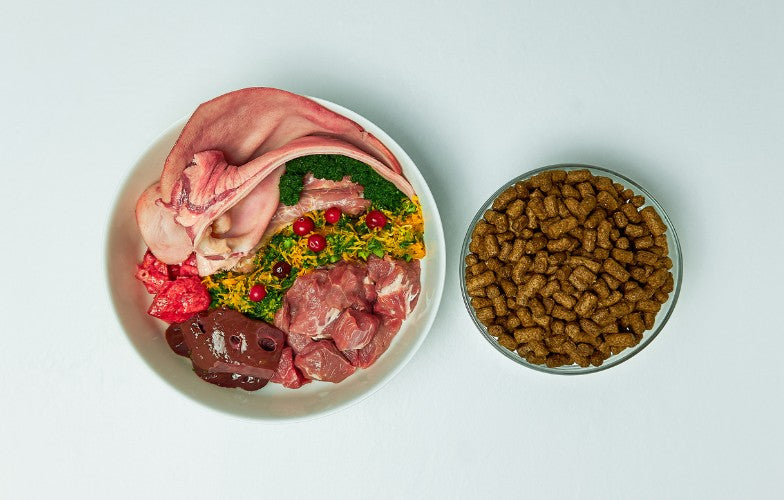Free shipping for orders over £39
Your cart is empty
A central topic of the study is the intestinal microbiome of dogs. This complex network of microorganisms in the digestive tract not only influences digestion, but also the immune system and general health. The "Trust Your Gut" study has shown that switching from dry food to BARF causes significant changes in the gut microbiome.

One of the most remarkable findings of the study is the increased bacterial diversity in the gut of dogs that have been switched to raw feeding. Greater diversity usually means a more robust and healthier microbiome. Particularly pleasing is the increase in beneficial bacterial strains such as Lactobacillus and Bifidobacterium, while harmful bacteria decreased.
Your dog's gut microbiome consists of a colourful mixture of bacteria, viruses, fungi and other microorganisms. The little helpers called lactobacilli and bifidobacteria are crucial for digestion, the production of vitamins, protection against pathogens and the regulation of the immune system. A balanced gut microbiome is therefore the key to a healthy dog. If this balance is disturbed, which is known as dysbiosis, problems such as inflammation, allergies and digestive disorders can result.

Another highlight of the study is the anti-inflammatory effect of raw feeding. The researchers found a reduction in inflammatory markers in the dogs' blood, which indicates a stronger immune defence. This is particularly important as chronic inflammation can lead to various health problems in the long term.

Dry food and raw feeding differ considerably in their composition. Conventional dry food from the shops often contains a lot of gluten, preservatives and synthetic additives. A bowl of raw food, on the other hand, consists of raw meat, bones, offal, vegetables and fruit - in other words, food that comes closer to the dog's natural diet.


The longer a dog has been fed dry food and the older it is, the more strenuous the changeover is for the body. The body should therefore be given the opportunity to get used to the new food at its own pace. It is also advisable to proceed step by step and not to serve the dog a complete BARF meal from one day to the next. Feeding bones in particular is a special matter to which the dog should be introduced slowly.
If you are thinking about switching your dog to a raw diet, you should listen to your gut feeling and make the switch. We can now say that raw feeding will positively change your dog's gut microbiome and lead to a healthier gut that can absorb more nutrients. This happy population of gut microbes will ensure that your dog has a healthier gut, brain and joints, even in older dogs that are more difficult to feed.
The species-appropriate mixture of purely natural ingredients completes the balanced raw diet with vitamins and minerals. Natural nutrients support the microbiome and microflora in your dog's gut thanks to their high bioavailability, as natural foods also contain secondary plant substances and enzymes in addition to vitamins and minerals, which support the absorption and utilisation of nutrients.
An excellent source of calcium, important for your dog's bone and dental health. Feeding ground bones is particularly well tolerated and can be particularly helpful when switching from dry food to barf if your dog is not yet used to eating raw meaty bones. Ground bones also promote healthy digestion.
The only mixture of high-quality oils that provides your dog with valuable essential omega-3, -6 and -9 fatty acids. These essential fatty acids are effective supporters and, among other things, necessary for the absorption of fat-soluble vitamins (A, D, E, K). They also generally increase the bioavailability of certain nutrients, such as carotenoids (precursors of vitamin A) and other fat-soluble phytonutrients. They serve as an important source of energy for intestinal cells and stimulate the production of bile in the liver. The high proportion of essential omega-3 fatty acids can also reduce inflammation.